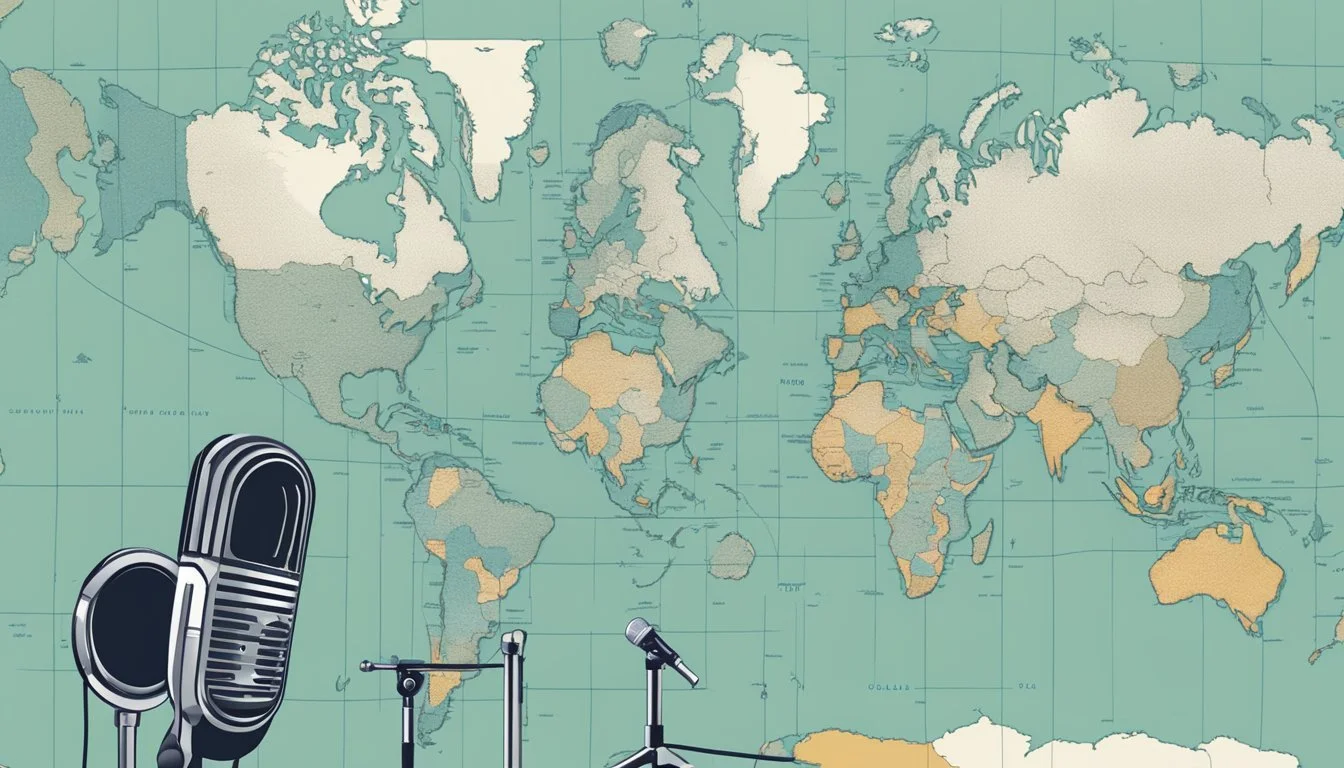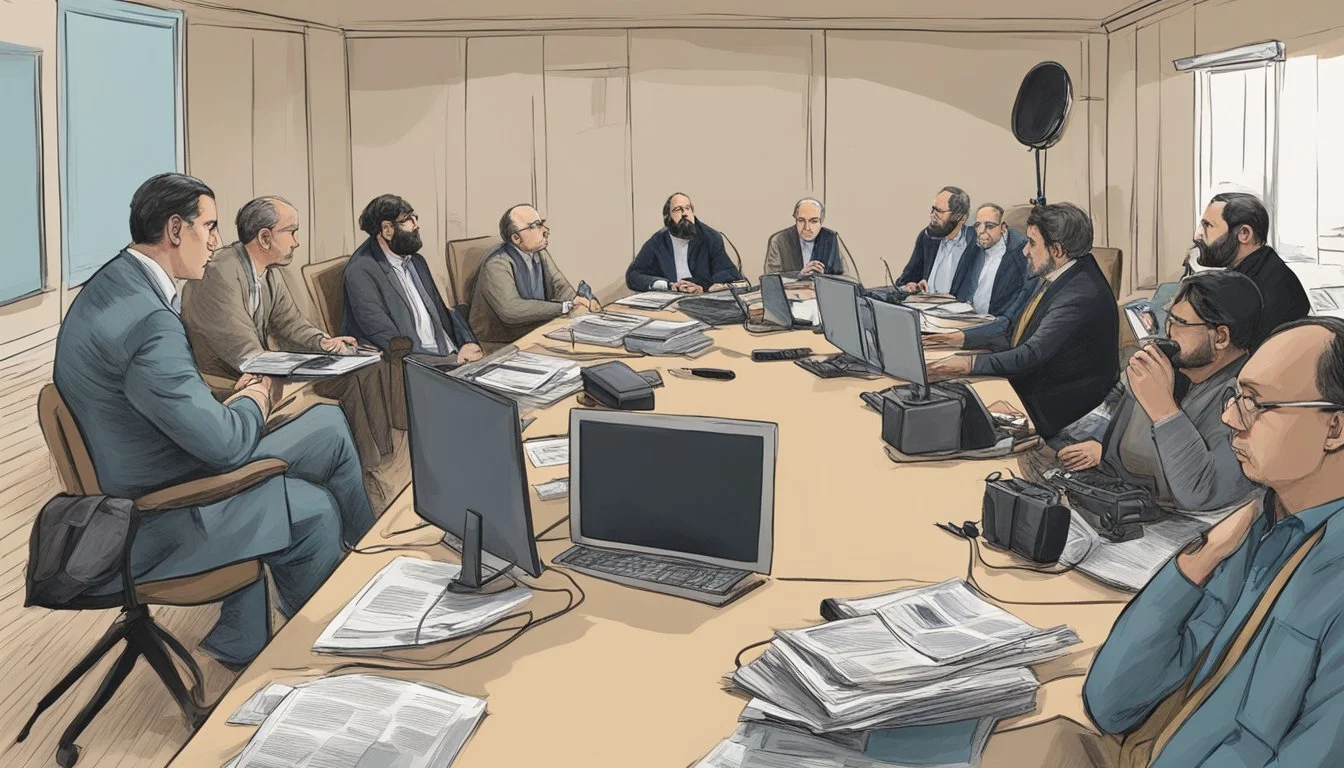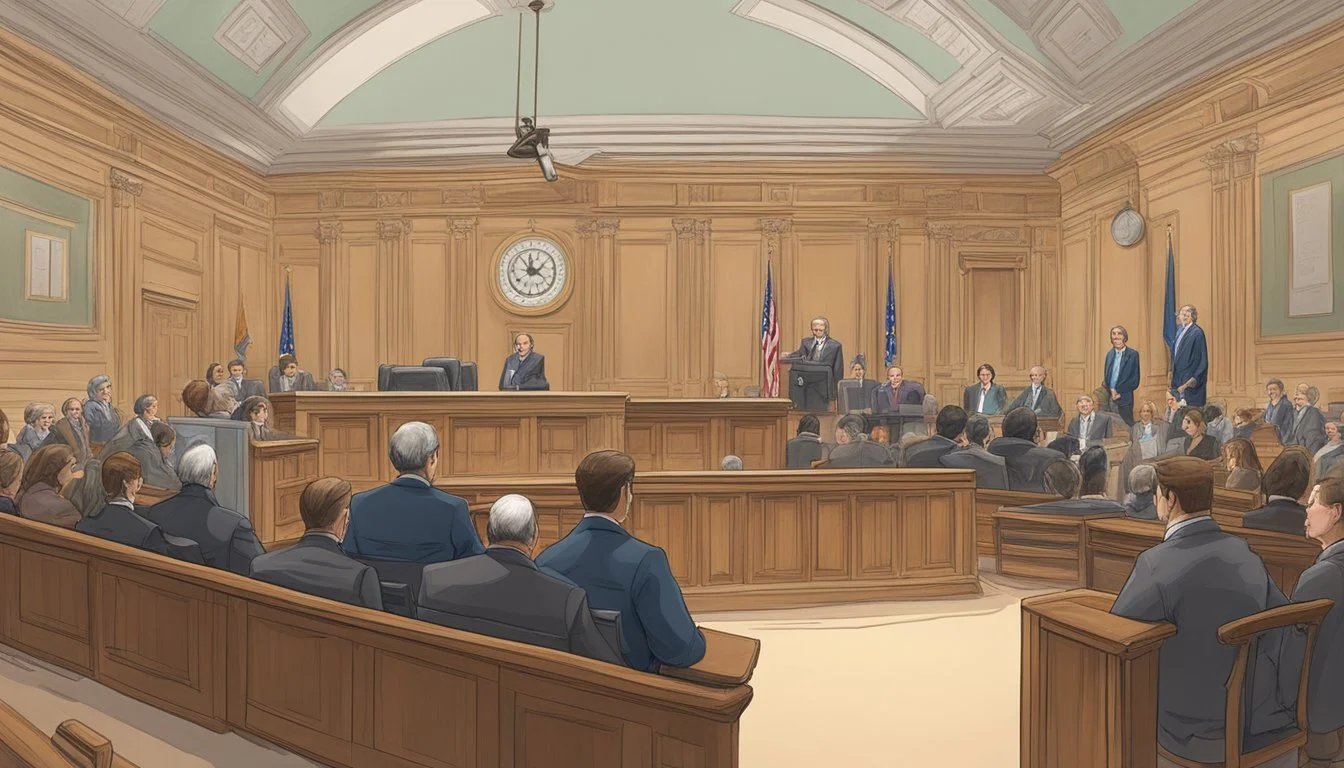Caliphate: From New York Times Audio to Global Documentary Discourse
Examining Media Impact and Controversy
"Caliphate," a groundbreaking audio series from The New York Times, captivated audiences with its intense exploration of the Islamic State. Hosted by award-winning foreign correspondent Rukmini Callimachi, the podcast offered listeners an unprecedented look into the inner workings of ISIS and the fall of Mosul. The series garnered widespread attention for its immersive storytelling and deep dive into one of the most pressing global issues of our time.
The podcast's impact extended far beyond its initial release, sparking conversations about journalism, terrorism, and the power of audio storytelling. It featured interviews with former ISIS members and provided a nuanced perspective on the complex realities of life under the caliphate. The New York Times' foray into long-form audio journalism with "Caliphate" set a new standard for investigative reporting in the digital age.
However, the series also faced controversy when the credibility of a key source came into question. This development led to broader discussions about fact-checking in journalism and the challenges of reporting on clandestine organizations. Despite these issues, "Caliphate" remains a significant work that pushed the boundaries of audio documentary and brought critical global issues to the forefront of public discourse.
The Emergence of 'Caliphate': From Podcast to Global Phenomenon
'Caliphate' began as a groundbreaking audio series from The New York Times, quickly capturing global attention. Its innovative storytelling and in-depth reporting on the Islamic State propelled it beyond podcasting circles into wider documentary discourse.
Origins of the 'Caliphate' Podcast
The New York Times launched 'Caliphate' in April 2018 as part of its growing audio journalism portfolio. The podcast aimed to provide an immersive exploration of the Islamic State's rise and fall.
It was designed as a 10-episode series, building on the success of The Times' daily news podcast, "The Daily". 'Caliphate' represented a bold step into long-form audio storytelling for the newspaper.
The series became available on major platforms like Apple Podcasts and Spotify, expanding its reach to a diverse, global audience.
Rukmini Callimachi's Role and Expertise
Rukmini Callimachi, an award-winning foreign correspondent for The New York Times, served as the host and central figure of 'Caliphate'. Her expertise in covering terrorism and the Islamic State was crucial to the podcast's development.
Callimachi's reporting from Mosul and other conflict zones brought authenticity and depth to the series. Her interviews with ISIS members and victims provided listeners with unprecedented access to complex narratives.
Her journalistic approach combined rigorous fact-checking with empathetic storytelling, setting a new standard for audio documentaries.
The Growth of an Audio Series to a Documentary Discourse
'Caliphate' quickly transcended its original format, sparking discussions in academic, political, and media circles. Its narrative style and investigative approach influenced other podcasts and documentaries on similar topics.
The series' impact extended beyond audio, with its content being referenced in print articles, television programs, and policy debates. It became a valuable archive of firsthand accounts and expert analysis on the Islamic State.
'Caliphate' faced scrutiny and controversy, particularly regarding the veracity of one key source. This sparked important conversations about journalistic methods in podcast storytelling.
Examining the Caliphate's Narrative: Content and Character
The "Caliphate" podcast crafted a compelling narrative around ISIS through its structure, character focus, and editorial choices. It centered on Abu Huzayfah's account while incorporating expert analysis and reporter insights.
Narrative Structure and Key Themes
"Caliphate" employed a serialized format, unfolding over 12 episodes. Each installment built upon the previous, creating a sense of urgency and revelation.
The podcast explored ISIS recruitment tactics, daily life under the caliphate, and the group's ideology. It delved into the psychological aspects of radicalization and the appeal of extremist ideologies to some individuals.
Themes of violence, religious fervor, and disillusionment featured prominently. The narrative juxtaposed the initial allure of ISIS with the brutal realities encountered by those who joined.
Profile of Abu Huzayfah
Abu Huzayfah emerged as the central figure in "Caliphate." His story of joining ISIS, participating in executions, and eventual return to Canada formed the podcast's backbone.
The series presented Huzayfah as a complex character - both perpetrator and victim. It explored his motivations, experiences, and apparent remorse.
Huzayfah's graphic descriptions of violence and ISIS operations lent the podcast a sense of authenticity and insider access. His account provided listeners with a seemingly firsthand perspective of life within the terrorist organization.
Narrator Interventions and Editorial Choices
Rukmini Callimachi served as the primary narrator, guiding listeners through the investigation. Her interventions contextualized Huzayfah's story and provided expert analysis.
Editors Samantha Henig and Wendy Dorr shaped the narrative through their selection and arrangement of material. They interwove Huzayfah's account with other sources and fact-checking attempts.
The podcast used dramatic audio elements, including music and sound effects, to heighten tension and maintain audience engagement. These choices contributed to the series' immersive quality.
Editorial decisions to include graphic descriptions of violence sparked debate about journalistic ethics and the potential for sensationalism.
Reflecting on the ISIS Ideology and Its Atrocities
The Islamic State's extreme ideology and brutal acts shocked the world. Its rise and fall left deep scars across Syria, Iraq, and beyond.
Ideological Foundations of the Islamic State
ISIS adhered to a radical interpretation of Salafi jihadism. It sought to establish a caliphate based on a strict version of Sharia law. The group rejected modern borders and aimed to unite all Muslims under its rule.
ISIS justified violence against those it deemed apostates or infidels. It promoted an apocalyptic worldview, believing in an imminent final battle between true believers and nonbelievers.
The group's ideology appealed to some Muslims feeling marginalized or seeking purpose. ISIS used sophisticated propaganda to recruit followers globally.
Reported Atrocities and Their Impact
ISIS committed numerous atrocities during its reign. In 2014, it captured Mosul, Iraq's second-largest city. The fall of Mosul marked a turning point in ISIS's expansion.
The group's acts included:
Mass executions
Enslavement of women and children
Destruction of cultural heritage sites
ISIS's brutality sparked international outrage. It led to a global coalition against the group. The campaign to defeat ISIS resulted in widespread destruction in Syria and Iraq.
Evidence of ISIS atrocities continues to emerge. Mass graves have been discovered in former ISIS-controlled areas. Survivors bear physical and psychological scars from their experiences.
Journalistic Integrity and Challenges in Reporting on ISIS
Reporting on ISIS presents unique challenges for journalists, requiring rigorous fact-checking and ethical considerations. The "Caliphate" podcast controversy highlighted the complexities of verifying information in conflict zones and the responsibilities of foreign correspondents.
Fact-Checking and Corroboration in Conflict Zones
Journalists covering ISIS face significant obstacles in verifying information. Limited access to territories controlled by the group makes direct observation difficult. Reporters often rely on local sources, whose credibility can be hard to assess.
Fact-checking in these environments requires cross-referencing multiple sources and seeking independent verification. Journalists must be cautious of potential misinformation or propaganda spread by various actors.
Corroboration often involves analyzing satellite imagery, social media posts, and official statements. However, these methods have limitations and can be manipulated.
The Controversy of Accuracy and 'Caliphate'
The New York Times podcast "Caliphate" sparked debate about journalistic standards in reporting on ISIS. The series featured an alleged ISIS member whose claims were later found to be fabricated.
This incident exposed weaknesses in the verification process. Critics argued that the desire for a compelling narrative overshadowed rigorous fact-checking.
The controversy led to an internal review at the New York Times. It resulted in a retraction and raised questions about the balance between storytelling and accuracy in podcast journalism.
The Role of the Foreign Correspondent
Foreign correspondents like Rukmini Callimachi play a crucial role in bringing stories from conflict zones to global audiences. They often work in dangerous conditions and face ethical dilemmas.
These journalists must navigate complex cultural and political landscapes. They rely on local fixers and translators, which can introduce additional layers of potential misinterpretation.
Foreign correspondents bear responsibility for the accuracy of their reporting. They must balance the need for compelling stories with strict adherence to journalistic standards.
The "Caliphate" case highlighted the importance of robust editorial oversight for foreign correspondents, especially when reporting on sensitive topics like terrorism.
The Role of New York Times in the Podcast's Production and Fallout
The New York Times played a central role in the creation, promotion, and subsequent controversy surrounding the "Caliphate" podcast. The newspaper's involvement spanned from initial production to the fallout that ensued after revelations of misrepresentation came to light.
Editorial Oversight by the Times Staff
The New York Times assembled a team of experienced journalists and audio producers to create "Caliphate." Rukmini Callimachi, a prominent terrorism reporter, served as the host and lead investigator. The audio department, led by Samantha Henig and Lisa Tobin, oversaw the production process.
Editors from various departments, including international news and investigative reporting, provided guidance and fact-checking. The podcast received significant resources and support from the Times, reflecting the organization's commitment to audio storytelling.
Despite the involvement of multiple staff members, the podcast's vetting process faced criticism for failing to identify crucial inconsistencies in the central narrative.
Implications of the Shehroze Chaudhry Misrepresentation
Shehroze Chaudhry, the main subject of "Caliphate," claimed to be a former ISIS member. His accounts formed the backbone of the podcast's narrative. However, Canadian authorities later charged Chaudhry with perpetrating a terrorist hoax.
This development forced the Times to reexamine the podcast's content and journalistic practices. The newspaper conducted an internal review, which revealed significant lapses in the verification process.
The misrepresentation damaged the Times' reputation and raised questions about the rigor of its fact-checking procedures, especially in audio journalism.
Reactions and Accountability Post-Controversy
The New York Times faced widespread criticism from media outlets, public radio stations, and journalism experts. The newspaper retracted the core of the "Caliphate" series and returned the Peabody Award it had won.
Executive editor Dean Baquet acknowledged the failure to apply rigorous journalistic standards. The Times reassigned Rukmini Callimachi to a new beat and implemented stricter guidelines for audio productions.
The controversy prompted discussions within the industry about the challenges of adapting print journalism practices to audio formats. It also highlighted the need for enhanced fact-checking processes in podcast production.
Expanding Reach: Subscriber Engagement and Distribution Channels
The New York Times leveraged multiple platforms and strategies to expand the reach of "Caliphate" and engage subscribers. These efforts focused on promoting the series across social media and podcast apps while closely analyzing audience growth and listening patterns.
Promotion on Platforms Like Instagram and Podcast Apps
The Times promoted "Caliphate" heavily on Instagram, sharing teasers and behind-the-scenes content to build anticipation. Short audio clips and eye-catching visuals highlighted key moments from episodes. On podcast apps like Apple Podcasts and Spotify, the series received prominent placement and was featured in curated lists.
Cross-promotion occurred on other New York Times podcasts. Host appearances on popular shows like "The Daily" introduced "Caliphate" to a wider audience. Email newsletters sent to Times subscribers contained episode links and exclusive bonus content.
Analyzing Subscriber Growth and Listenership
The Times closely tracked subscriber growth and listening patterns throughout "Caliphate's" run. Data showed spikes in new subscriptions coinciding with episode releases. Analytics revealed which episodes resonated most with listeners based on completion rates and sharing metrics.
Demographic information helped identify key audience segments. This data informed future content decisions and marketing strategies. The series' performance on nytimes.com/caliphate versus third-party platforms was compared to optimize distribution.
Listener surveys provided qualitative feedback on the series' impact and appeal. This input shaped plans for potential follow-up content and informed the approach to future audio documentaries.
Awards and Recognition: Assessing the Documentary's Success
"Caliphate" garnered significant attention in the documentary world, receiving both accolades and scrutiny. The audio series stood out for its innovative approach to investigative journalism in podcast form.
Pulitzer Prize Consideration and Reevaluation
The New York Times submitted "Caliphate" for Pulitzer Prize consideration in 2019. Initially, the series was named as a finalist in the International Reporting category. This recognition highlighted the podcast's impact on journalism and its ability to compete with traditional print media.
However, the Pulitzer Prize Board later rescinded the finalist status. This decision came after concerns arose about the veracity of a key source in the series. The reevaluation process underscored the importance of fact-checking in documentary journalism, even in emerging formats like podcasts.
Acknowledgement by the International Documentary Association
"Caliphate" received notable recognition from the International Documentary Association (IDA). The IDA awarded the series its inaugural Best Audio Documentary award. This accolade marked a significant milestone for audio documentaries in the broader documentary landscape.
The award demonstrated the growing importance of podcasts as a medium for in-depth reporting and storytelling. It also highlighted the IDA's expanding scope to include audio formats alongside traditional visual documentaries. This recognition helped solidify "Caliphate's" place in the evolving world of documentary journalism.
Cultural and Social Impact: Beyond the Podcast Medium
Caliphate sparked intense discussions about terrorism, media representation, and journalistic ethics. Its influence extended far beyond the podcast medium, shaping educational approaches and broader societal conversations.
Educational Influence and Documentary Discussions
Caliphate became a key resource in academic settings. Universities incorporated the podcast into journalism and media studies curricula. Students analyzed its narrative techniques and ethical considerations. The series prompted debates on the challenges of reporting on terrorism and conflict zones.
Documentarians drew inspiration from Caliphate's immersive storytelling approach. Film and television producers adapted elements of its audio format to visual mediums. This cross-pollination enriched documentary storytelling across platforms.
Broader Conversations on Terrorism and Media
Caliphate ignited public discourse on the rise of the Islamic State and its atrocities. The podcast's intimate portrayal of former ISIS members humanized a complex issue. This sparked debates on radicalization, deradicalization, and the roots of extremism.
Media critics scrutinized Caliphate's impact on public perceptions of terrorism. Questions arose about the ethics of giving a platform to former extremists. The series prompted discussions on responsible reporting of sensitive topics and the potential for inadvertent glorification.
Behind the Scenes: Key Persons and their Contributions
The creation of "Caliphate" involved numerous talented individuals who brought diverse skills and perspectives to the project. Their collaborative efforts shaped the podcast's narrative and production quality.
Insights from the Editorial Team and Production Crew
Andy Mills and Rukmini Callimachi served as the primary producers of "Caliphate". Mills, an experienced audio journalist, focused on crafting the podcast's sonic landscape. Callimachi, a renowned terrorism reporter, provided deep subject matter expertise.
Samantha Henig, as editorial director, guided the overall vision and strategy for the series. Lisa Tobin, executive producer of audio, oversaw the production process and ensured high-quality output.
Larissa Anderson and Wendy Dorr contributed their audio editing skills, refining the narrative structure and pacing. Their work helped create a compelling listening experience for the audience.
Contributions of Statement Voices and Guests
Michael Barbaro, host of "The Daily", made guest appearances in "Caliphate". His familiar voice helped introduce new listeners to the series and provided context for complex topics.
Asthaa Chaturvedi conducted additional reporting and interviews, adding depth to the podcast's content. Her work expanded the range of perspectives presented in the series.
Sam Dolnick, as assistant managing editor, played a crucial role in integrating "Caliphate" into The New York Times' broader journalism efforts. He helped position the podcast within the organization's multimedia strategy.
The series also featured various subject matter experts and individuals with firsthand experiences related to ISIS. These guests provided crucial insights and personal narratives that enriched the podcast's storytelling.
Legal Aftermath: The Case of Shehroze Chaudhry and Implications for Journalism
The Shehroze Chaudhry case exposed significant issues in journalistic practices and legal consequences of false terrorism claims. It sparked debates on media ethics and the verification of sources in high-profile stories.
Canadian Legal Proceedings and Aftermath
Shehroze Chaudhry, a Pakistani-Canadian, faced legal repercussions for his fabricated tales of ISIS involvement. Canadian authorities arrested him for perpetrating a terrorist "hoax". The Royal Canadian Mounted Police (RCMP) conducted an investigation focusing partly on his statements in the New York Times podcast "Caliphate".
Chaudhry's case proceeded through the Canadian legal system. He was required to post a $10,000 peace bond, which would be forfeited if he violated the terms of his agreement with the court. His court appearances continued, with a scheduled return on January 25.
The legal aftermath highlighted the serious consequences of falsely claiming terrorism involvement, even in media interviews.
Exploring the Ethical Boundaries of Journalism
The Chaudhry case raised critical questions about journalistic practices and source verification. It exposed vulnerabilities in the process of vetting sources for high-profile stories, especially those involving sensitive topics like terrorism.
Media organizations faced scrutiny over their fact-checking procedures. The incident prompted discussions on the balance between compelling storytelling and factual accuracy in journalism.
The case underscored the importance of rigorous fact-checking, especially when dealing with extraordinary claims. It emphasized the need for multiple sources and independent verification in investigative journalism.
Media ethics came under the spotlight, with debates on the responsibilities of journalists and publishers in presenting unverified information to the public.
Conclusion
The "Caliphate" podcast series sparked intense debate about journalistic practices and fact-checking standards. Its retraction highlighted the importance of rigorous verification, especially when covering complex international stories.
The New York Times faced criticism for its handling of the podcast. This incident prompted media organizations to reassess their approaches to investigative reporting and source vetting.
The fallout from "Caliphate" led to improvements in fact-checking processes across the podcast industry. Many outlets implemented stricter guidelines for corroborating sensitive claims.
Despite the controversy, the series raised awareness about ISIS and its recruitment tactics. It also demonstrated the power of audio storytelling to engage audiences with challenging topics.
The "Caliphate" saga serves as a cautionary tale for journalists and media companies. It underscores the need for thorough research, multiple sources, and skepticism when reporting on extremist groups.
Ultimately, the podcast's legacy is mixed. It showcased both the potential and pitfalls of long-form audio journalism in covering global conflicts and terrorism.







